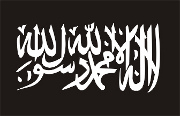%2009-27-13.jpg) |
| (Image courtesy Open Doors USA) |
The Associated Press reports Islamic militants attacked the church in Yobe state just before dawn yesterday; the incident went unnoticed by nearly all major media outlets.
Dr. David Curry, President and CEO of Open Doors USA, points to the attack as the latest in a rising tide of persecution sweeping the Middle East and North Africa (MENA).
"We've had situations in the last three weeks in Iraq, in Syria, in Pakistan, and now last night in northern Nigeria, where people are targeting believers," says Curry. "My greatest concern is that there won't be any pressure to follow-up on this attack.
"Attack after attack on Christians seems to go by the wayside."
Thousands have fallen in Nigeria alone at the hands of the Islamic terrorist group, Boko Haram. Their name means "Western education is sinful," and their four-year-old terror campaign seeks to rid northeast Nigeria of all who follow Christ.
Yobe is one of three northeastern states currently under emergency rule, as Nigerian President Goodluck Jonathan tries to quell Boko Haram insurgents.
"The threat of terrorism in a few states in the northeastern part of our country has proven to be a challenge to national stability," Jonathan told UN leaders earlier this week. "We will spare no effort in addressing this menace."
Terror goes by a different name in the nearby Central African Republic: Seleka. This band of Islamic terrorists rose to national power in March following the ouster of former President Francois Bozize.
Their primary target soon became the Church.
"The various atrocities that preceded, accompanied, and followed Seleka's rise to power have been specifically aimed at the Christian population," states a letter from the CAR Evangelical Alliance to Seleka Islamist leader and CAR President Michel Djotodia.
"Churches and Christian institutions have been desecrated and plundered, priests and pastors have been assaulted, and nuns raped."
In CAR, 50% of the population is Christian and 15% are Muslim. Despite outnumbering the followers of Islam, Christian communities in CAR claim their Muslim neighbors are joining Seleka’s violent campaigns.
"It’s not like Christianity is a minority religion, but ever since the coup in March, the Muslims have increased their persecution of Christians," said Open Doors spokesman Jerry Dykstra in a July 5 article.
To the north, a similar situation unfolds as violence against Christians in Egypt reaches historic levels. Members of the Muslim Brotherhood (MB) were quick to blame Coptic Christians for the July removal of MB proponent and former President Mohamed Morsi from office.
It was a summer of rage for many believers as they endured beatings, their homes and businesses were looted and destroyed, and churches were set aflame. In August, one church was forced to close its doors for the first time in 1,600 years.
And yet, most believers and secular media alike remain unaware of the deadly trend.
"Open Doors has been trying to raise this awareness among Western believers and the media in general," says Curry. "We believe it's worthwhile asking the question: 'Are these attacks coordinated?' Certainly they seem to be intentional and directed at believers.
"Over the last decades…the population of Christians in the Middle East has gone from 20% to 4%. Why is that? It is because there is a concerted effort to force Christians to convert. There is a concerted effort to persecute Christians, to drive them from their home."
As the plight of believers in the MENA continues on, largely unnoticed, you can take action.
"There are so many ways we can support the Persecuted Church," Curry states, "but you won't know how until you get this International Day of Prayer packet, an IDOP packet."
The International Day of the Prayer for the Persecuted Church (IDOP) gathers believers worldwide in continuous prayer for those who are persecuted. This year, IDOP falls on November 3.
"What we're asking is that every believer in the Western world that worships in freedom takes part on November 3rd in praying and supporting the Persecuted Church," explains Curry.
"We're not a political organization, but what we can do is rally believers to defend and to pray and support their brothers and sisters in the Persecuted Church."





%2009-02-13.jpg)




%2007-19-13.jpg)
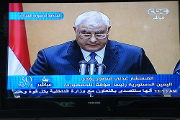
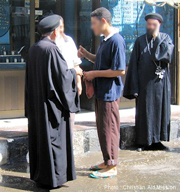
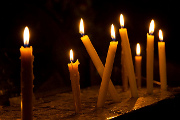
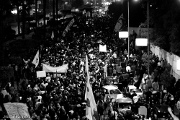
.png)

